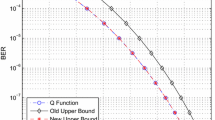Abstract
This paper studies the capacity issue of adaptive multiple-input-multiple-output (MIMO) transmissions with channel state information (CSI) feedback over a time-varying channel which is modeled as time-correlated blocks. The CSI is estimated at the receiver and fed back periodically to the transmitter to enable adaptive transmissions. With the objective to maximize the ergodic capacity, a CSI-feedback strategy is proposed based on the optimization of following two parameters. (1) The bit number for the quantization of each CSI and (2) the time interval to refresh the CSI. The first parameter determines the accuracy of the quantization and the latter one deal with the time variation of the channel. The optimization is conducted under a given feedback-capacity constraint i.e., the maximum number of feedback bits per block is fixed in average. A theoretical result is derived and numerical results are presented to show the effectiveness of the proposed strategy.
Similar content being viewed by others
References
Foschini G.J. (1996) Layered space-time architecture for wireless communication in fading environments when using multi-element antennas. Bell Labs Technical Journal, 1: 41–59
Foschini G. J., Gans M. J. (1998) On limits of wireless communications in a fading environment when using multiple antennas. Wireless Personal Communications 6(3): 311–335
Telatar I. E. (1999) Capacity of multi-antenna Gaussian channels. European Transactions on Telecommunications 10(6): 585–595
Roh J. C., Rao B. D. (2004) Multiple antenna channels with partial channel state information at the transmitter. IEEE Transactions on Wireless Communications 3(2): 677–688
Lau V., Liu Y., Chen T. A. (2004) On the design of MIMO block-fading channels with feedback-link capacity constraint. IEEE Transactions on Communications 52(1): 62–70
Samardzija D., Mandayam N. (2003) Pilot-assisted estimation of MIMO fading channel response and achievable data rates. IEEE Transactions on Signal Processing 51(11): 2882–2890
Hassibi B., Hochwald B. M. (2003) How much training is needed in multiple-antenna wireless links? IEEE Transactions on Information Theory 49(4): 951–963
Onggosanusi E. N., Gatherer A., Dabak A. G., Hosur S. (2001) Performance analysis of closed-loop transmit diversity in the presence of feedback delay. IEEE Transactions on Communications 49(9): 1618–1630
Love D. J., Heath R. W. Jr., Strohmer T. (2003) Grassmannian beamforming for multiple-input multiple-output wireless systems. IEEE Transactions on Information Theory 49: 2735–2747
Mukkavilli K. K., Sabharwal A., Erkip E., Aazhang B. (2003) On beamforming with finite rate feedback in multiple antenna systems. IEEE Transactions on Information Theory 49: 2562–2579
Zhou S., Wang W., Giannakis G. B. (2005) Quantifying the power loss when transmit beamforming relies on finite-rate feedback. IEEE Transactions on Wireless Communications 4(7): 1948–1957
Larsson E. G., Ganesan G., Stoica P., Wong W.-H. (2002) On the performance of orthogonal space-time block coding with quantized feedback. IEEE Communications Letters 6: 487–489
Love D. J., Heath R. W. Jr. (2005) Limited feedback unitary precoding for orthogonal space-time block codes. IEEE Transactions on Signal Processing 53: 64–73
Akhtar J., Gesbert D. (2004) Extending orthogonal block codes with partial feedback. IEEE Transactions on Wireless Communications, 3: 1959–1962
Love D. J., Heath R. W. Jr. (2005) Limited feedback unitary precoding for spatial multiplexing systems. IEEE Transactions on Information Theory 51: 2967–2976
Zhang D., Wei G., Zhu J., Tian Z. (2007) On the bounds of feedback rates for pilot-assisted MIMO systems. IEEE Transactions on Vehicular Technology 56(4): 1727–1736
Sadrabadi M. A., Maddah-Ali M. A., Khandani A. K. (2007) On the capacity of time-varying channels with periodic feedback. IEEE Transactions on Information Theory 53(8): 2910–2915
Narula A., Lopez M. J., Trott M. D., Wornell G. W. (1998) Efficient use of side information in multiple antenna data transmission over fading channels. IEEE Journal on Selected Areas in Communications 16(8): 1423–1436
Author information
Authors and Affiliations
Corresponding author
Rights and permissions
About this article
Cite this article
Li, W., Ma, M. & Jiao, B. Optimization of Feedback for Adaptive MIMO Transmissions Over Time Varying Channels. Wireless Pers Commun 54, 579–590 (2010). https://doi.org/10.1007/s11277-009-9741-0
Received:
Accepted:
Published:
Issue Date:
DOI: https://doi.org/10.1007/s11277-009-9741-0




